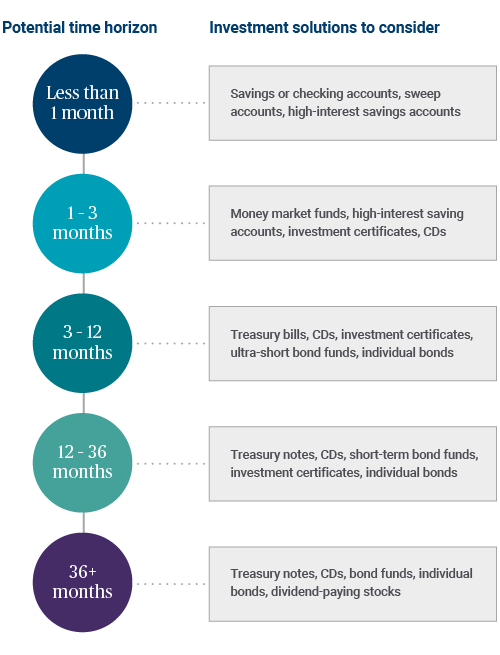3 tips for short-term investing
Discover how to invest for short-term gains with this guide.

While many investments are designed to grow over extended time periods, there may be occasions — such as saving for a large purchase or the down payment on a home — when you have a shorter time horizon to reach your goal. But even if you have less time, there are still a variety of investments to help your money grow.
An Ameriprise financial advisor can help customize strategies to help you reach your short-term goals while still staying on track for the long term. Here are three tips for short-term investing:
1. Avoid riskier assets
If you’re investing for a short period of time, you may want to reduce your exposure to potential market volatility since there won’t be time to recover from any losses that can occur. For example, after the “dot-com” stock bubble of the early 2000s, the stock market didn't fully rebound for several years.
In addition, consider investing in assets that are easily convertible to cash since you likely need the funds sooner than later. Generally, it’s wise to avoid assets that can be more volatile and less liquid when investing for short-term goals, such as stocks and alternative investments.
Learn more: How to determine risk tolerance for investing
2. Understand your short-term investing options
Though longer time horizons offer more investment choices, there are still a variety of ways to help your money grow if you have a limited window. Here’s a look at some of the most common short-term investments that are generally lower risk:
- High-yield savings accounts and money market accounts: These accounts offer immediate access to cash and typically higher interest rates than traditional checking accounts (with the interest rates for accounts from online banks often higher than those at brick-and-mortar institutions). High-yield savings accounts and money market accounts are also generally low risk, as both are insured by the FDIC up to $250,000 per institution, per depositor.
- Money market funds: Money market funds are mutual funds that invest exclusively in cash instruments and offer a low level of risk and a high level of liquidity. The funds typically offer higher yields than savings or checking accounts but may require waiting a day to access cash when withdrawing your money.
- Certificates of deposit (CDs): CDs are low-risk, fixed-term investments that typically offer higher interest rates than regular savings accounts and may also be insured by the FDIC. A no-penalty CD lets you avoid the penalty fee that banks typically charge if you cancel the CD before it matures.
- Treasury bills: These short-term U.S. government debt obligations are available in maturities that range from only a few days to one year. T-bills do not actually pay interest: They are sold to investors at a discount from their face value, with your return being the difference between the face value and the discounted price paid for the bill. Because T-bills are backed by the full faith and credit of the U.S. government, they are considered a safer investment. It is important to remember that once the bill matures, there will be no further growth until you reinvest it with another T-bill or another asset.
- Treasury notes: Like T-bills, Treasury notes are fixed income investments that are low risk, highly liquid and backed by the U.S. government. Unlike T-bills, T-notes offer a fixed rate of interest paid every six months, and are available in 2-, 3-, 5-, 7- or 10-year maturities. T-notes are also state- and local-tax-free, meaning you only pay federal income taxes on the interest you earn. As with T-bills, it is important to remember that once the note matures there will be no further growth until you reinvest it with another note or another asset.
- Bonds and bond funds: A bond is essentially a loan an investor makes to a borrower — typically a government entity or a corporation — who promises to pay periodic interest payments plus the face value of the bond when it matures. Bond funds benefit from exposure to a diversified mix of bond issuers and maturities, though they are also subject to market risk. Corporate bond funds tend to offer higher yields than government bond funds, but both are highly liquid and can typically be bought and sold on any day that the financial markets are open.
- Investment certificates: Issued by financial institutions or brokerage firms, investment certificates can offer a partial buffer against market performance, as they typically have a discount CD component that is offered through a bank, and a performance component based on an underlying asset. Certificates are set for a predetermined amount of time, and liquidating funds prior to that time may result in a significant loss of principal. Depending on the offering, an investment certificate may or may not be FDIC insured.
- Dividend-paying stocks: Dividend stocks are shares of companies that regularly pay investors a portion of the company's earnings, and they can be an option for those with relatively short investment horizons. Though companies that pay dividends tend to be well established, payments are not guaranteed, and the value of the stock can fluctuate, potentially offsetting dividend payments.
Learn more: How much cash should I have in my portfolio?
3. Align your investments with your time horizon
Even when your investment horizon is relatively short, you’ll want to pinpoint the precise date you’ll need the funds, if possible. Knowing exactly when you hope to reach a specific goal can help determine which assets are more appropriate. If your goal involves a large purchase in three to six months, for example, cash investments may be a more suitable option than if you don’t need the money for several years, which will allow for a wider array of investment possibilities.
Below is a general framework to consider when assessing which investments are appropriate for different time horizons:

Learn more: Aligning investments with your financial goals
Achieve your short-term investing goals
An Ameriprise financial advisor can help you navigate different short-term investing options while also keeping you on track with your long-term financial goals and broader investment strategy.
When you’re ready to reach out to an Ameriprise financial advisor for a complimentary initial consultation, consider bringing these questions to your meeting.
When you’re ready to reach out to an Ameriprise financial advisor for a complimentary initial consultation, consider bringing these questions to your meeting.
warning Something went wrong. Do you want to try reloading? Try again
Or, request an appointment online to speak with an advisor.
At Ameriprise, the financial advice we give each of our clients is personalized, based on your goals and no one else's.
If you know someone who could benefit from a conversation, please refer me.
Background and qualification information is available at FINRA's BrokerCheck website.



